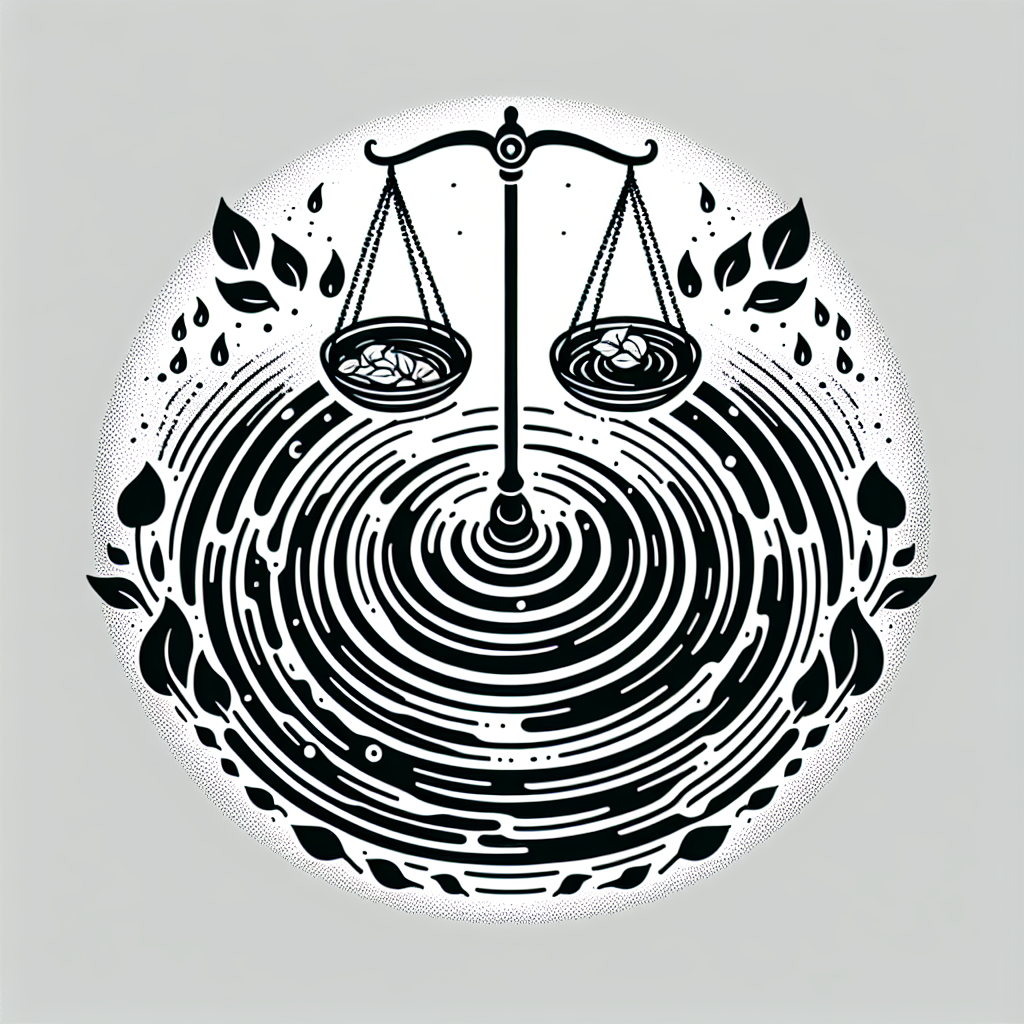The concept of the ripple effect suggests that small, seemingly insignificant actions can lead to significant outcomes. This idea can be seen in various contexts, from social change to environmental impact, and even in personal relationships. The ripple effect is both a phenomenon and a principle that emphasizes the interconnectedness of our actions. Understanding this can empower us to make positive changes in our lives, our communities, and the world at large.
Understanding the Ripple Effect
At its core, the ripple effect is about how one action can initiate a chain of events that perpetuates through a system. To visualize this, consider a stone thrown into a still pond. The stone creates a disturbance, causing ripples to spread outward. Each ripple represents a consequence that extends beyond the point of impact. In life, our decisions and actions behave similarly.
The ripple effect can be positive or negative. A simple act of kindness, such as complimenting a stranger, can uplift them and inspire them to perform kind deeds of their own, creating a chain reaction of positivity. Conversely, a negative action, like spreading gossip, can lead to misunderstandings and conflict, perpetuating a cycle of negativity.
Historical Examples of the Ripple Effect
Throughout history, there have been numerous instances where small actions sparked significant changes. Here are a few notable examples:
- The Butterfly Effect in Weather: This meteorological concept suggests that the flap of a butterfly’s wings in Brazil could set off a tornado in Texas. It highlights how minor changes in initial conditions can drastically alter outcomes in complex systems.
- The Civil Rights Movement: Rosa Parks’ decision to refuse her bus seat to a white man in Montgomery, Alabama, sparked the Montgomery Bus Boycott, which catalyzed nationwide efforts to end segregation and is often cited as a pivotal moment in the American civil rights movement.
- The Invention of the Internet: Tim Berners-Lee developed the World Wide Web as a tool for sharing information among scientists. This small endeavor has transformed how we communicate, work, and socialize worldwide.
The Ripple Effect in Personal Relationships
In our personal lives, the ripple effect plays a crucial role in shaping our relationships and community interactions. Small actions can substantially impact how others perceive us and the dynamics of our relationships. Here are some examples:
- A Smile: A simple smile can brighten someone’s day, leading them to be more positive and engaging in their interactions with others.
- Listening: When we genuinely listen to someone, it conveys respect and care, encouraging deeper connections and open communication.
- Sharing Knowledge: Educating someone on a topic can empower them, leading to their own initiatives and contributions in their circle of influence.
The Ripple Effect in Social Change
The ripple effect is a critical concept in social change efforts. Small movements or initiatives can ignite larger-scale changes. Activists and change-makers often use this principle to rally support for their causes:
- Grassroots Movements: Local efforts like neighborhood cleanups or community gardens can inspire larger environmental initiatives and community pride.
- Social Media Campaigns: A single tweet or post can mobilize millions to support a cause, often leading to legislative changes and increased awareness.
- Volunteering: Giving time to a local charity might inspire others to join in or even start their own initiatives, creating a culture of giving and community support.
The Ripple Effect in the Environment
Environmental actions also demonstrate profound ripple effects. Individual choices, when multiplied across many people, can lead to meaningful change:
- Recycling: One person recycling may seem insignificant, but if the entire community commits to recycling, it can significantly reduce waste and conserve resources.
- Conserving Water: Simple actions like turning off the tap while brushing teeth can save gallons of water daily, ultimately contributing to water conservation efforts.
- Planting Trees: One tree planted can provide oxygen, absorb CO2, and offer habitat for wildlife. Communities that plant trees see enhanced biodiversity and improved air quality.
Creating Positive Ripples: How to Maximize Your Impact
If understanding the ripple effect inspires you to take action, here are some practical strategies to maximize your positive impact:
1. Start Small
Every large change begins with small steps. Identify simple actions you can take daily that align with your values.
2. Lead by Example
Your behavior can influence others. Demonstrating kindness, empathy, and responsibility can encourage those around you to follow suit.
3. Share Your Actions
Spread awareness of your actions and the reasoning behind them. Whether it’s a social media post, a community board, or conversations, sharing can inspire action.
4. Foster Community Engagement
Involving others can amplify the ripple effect. Organize group activities or initiatives that encourage your community members to participate.
5. Reflect on Outcomes
Taking time to reflect on the consequences of your actions can help you understand how they affect others and encourage you to continue making positive changes.
Challenges of the Ripple Effect
While the ripple effect often leads to positive change, it can also create challenges:
- Miscommunication: Small misunderstandings can escalate rapidly, leading to conflict if not addressed promptly.
- Negative Actions: One person’s bad behavior can lead to a toxic environment, where negativity spreads and amplifies problems.
- Unintended Consequences: Actions taken with good intentions can have unforeseen negative impacts, highlighting the importance of thorough consideration before acting.
Case Studies of Ripple Effects in Action
1. The Ice Bucket Challenge
The Ice Bucket Challenge became a viral sensation in 2014, where participants dumped ice water on themselves to raise awareness and funds for ALS research. This simple act led to millions of dollars in donations and heightened awareness of ALS, showcasing how one creative idea can create a worldwide movement.
2. The #MeToo Movement
The #MeToo movement gained momentum after a series of personal stories about sexual harassment and assault were shared online. This cultural moment led to widespread discussion, activism, and policy changes, demonstrating how individual experiences can resonate globally, leading to systemic change.
Conclusion
Understanding the ripple effect allows us to recognize the power of our actions, no matter how small. Whether in personal relationships, social movements, or environmental efforts, we hold the potential to create waves of positive change. By being mindful of our actions and their consequences, we can contribute to a culture of kindness, responsibility, and awareness.
Embodying the ripple effect means making deliberate choices that inspire and empower others. Let us all embrace our capacity to create meaningful ripples that can lead to profound transformations in our own lives and the world around us.
FAQs
What is the ripple effect?
The ripple effect is a metaphor that illustrates how small actions can lead to significant consequences, often extending beyond the initial action and impacting various areas of life or society.
How can I create positive ripples in my community?
You can create positive ripples by participating in local activities, volunteering, spreading kindness, and encouraging others to engage in initiatives that promote community welfare.
Can small negative actions lead to big consequences?
Yes, small negative actions can escalate and lead to larger issues, such as conflicts or misunderstandings. It’s essential to communicate effectively and address issues early to prevent escalation.
How do I recognize the impact of my actions?
Reflecting on the feedback you receive from others, assessing changes in your environment, and being open to conversations about your actions can help you understand their impact.
Is the ripple effect always positive?
No, the ripple effect can produce both positive and negative outcomes. While small positive actions can inspire more good deeds, negative actions can propagate harmful effects if not addressed.
, It seems like you might want to provide a prompt for a specific topic or creative writing. Could you please specify what you’re looking for? Whether it’s a story, an idea, a question, or something else, I’d be happy to help!, #Ripple #Effect #Small #Actions #Create #Big #Consequences, #Ripple #Effect #Small #Actions #Create #Big #Consequences, 1734048768, the-ripple-effect-how-small-actions-create-big-consequences





